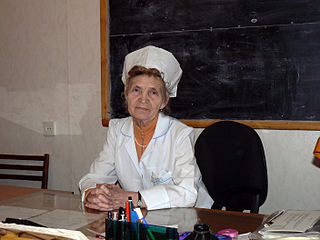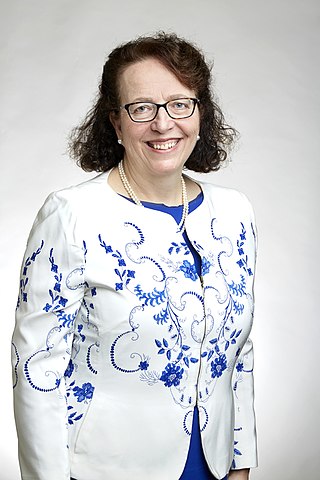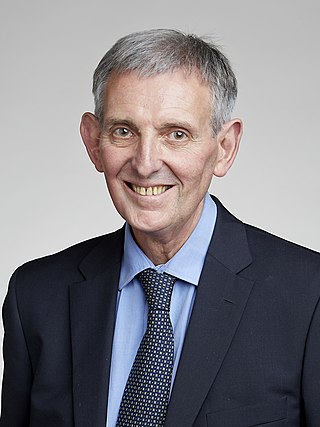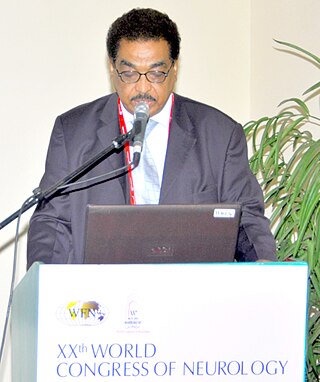Related Research Articles

Peter Charles Doherty is an Australian immunologist and Nobel laureate. He received the Albert Lasker Award for Basic Medical Research in 1995, the Nobel Prize in Physiology or Medicine jointly with Rolf M. Zinkernagel in 1996 and was named Australian of the Year in 1997. In the Australia Day Honours of 1997, he was named a Companion of the Order of Australia for his work with Zinkernagel. He is also a National Trust Australian Living Treasure. In 2009 as part of the Q150 celebrations, Doherty's immune system research was announced as one of the Q150 Icons of Queensland for its role as an iconic "innovation and invention".
Herbert Henri Jasper was a Canadian psychologist, physiologist, neurologist, and epileptologist.
Josemir W. Sander, also known as Ley Sander, is a Professor of Neurology and Clinical Epilepsy, and the head of Department of Clinical and Experimental Epilepsy, at UCL Queen Square Institute of Neurology. He is also a Professor of Neurology at West China Hospital, Sichaun University in Chengdu, China.
John S. Duncan is a British neurologist specialising in epilepsy. He is Professor of Clinical Neurology at University College London Institute of Neurology and Clinical Director of the National Hospital for Neurology and Neurosurgery at Queen Square, London.

The National Institute of Mental Health and Neuro-Sciences is a medical institution in Bengaluru, India. NIMHANS is the apex centre for mental health and neuroscience education in the country. It is an Institute of National Importance operating autonomously under the Ministry of Health and Family Welfare. NIMHANS is ranked 4th best medical institute in India, in the current National Institutional Ranking Framework.

Taisiya Sergeevna Osintseva was a Russian Professor of Neurology, The Honored Scientist of Russia, and The Honorary Professor of the Izhevsk State Medical Academy.

Sir Edward Byrne is a neuroscientist who, as of September 2024, serves as President of King Abdullah University of Science and Technology (KAUST), located in Thuwal, Saudi Arabia. Byrne served as President and Principal of King's College London from August 2014 until January 2021. and was previously President Vice-Chancellor of Monash University.
Peter Henry St George-Hyslop is a British and Canadian medical scientist, neurologist and molecular geneticist who is known for his research into neurodegenerative diseases. St George-Hyslop is one of the most cited authors in the field of Alzheimer's disease research. He has identified a number of key genes that are responsible for nerve cell degeneration and early-onset forms of Alzheimer's disease. These include the discovery of the presenilins, Nicastrin, TREM2, Apolipoprotein E and SORL1 genes. Presenilin mutations are the most common cause of familial Alzheimer's disease. St George-Hyslop also co-led the discovery of the gene for the amyloid precursor protein.
Samuel E. Gandy, is a neurologist, cell biologist, Alzheimer's disease (AD) researcher and expert in the metabolism of the sticky substance called amyloid that clogs the brain in patients with Alzheimer's. His team discovered the first drugs that could lower the formation of amyloid.
James O. McNamara is an American neurologist and neuroscientist, known for his research of epileptogenesis, the process underlying development and progression of epilepsy. He is the Duke School of Medicine Professor of Neuroscience in the Departments of Neurobiology, Neurology, and Pharmacology and Cancer Biology at Duke University. He served as chair of the Department of Neurobiology at Duke from 2002 to 2011
David Benjamin Goldstein is an American human geneticist. Goldstein is founding Director of the Institute for Genomic Medicine at the Columbia University Medical Center, Professor of Genetics and Development and directs the genomics core of Epi4K and administrative cores of Epi4K with Dan Lowenstein and Sam Berkovic.

Ingrid Eileen Scheffer is an Australian paediatric neurologist and senior research fellow at the Florey Institute of Neuroscience and Mental Health. Scheffer has made several major advances in the field of epilepsy research. Scheffer is credited with finding the first gene implicated in epilepsy. She has also described and classified novel epileptic syndromes such as Epilepsy limited to Females with Mental Retardation.
Kathryn Nance North is a paediatric physician, neurologist, and clinical geneticist. In 2013, she was appointed Director of the Murdoch Childrens Research Institute and was named the David Danks Professor of Child Health Research at the University of Melbourne. In 2012, North was appointed chair of the National Health and Medical Research Council Research Committee. In 2014, she was appointed vice chair of the Global Alliance for Genomics and Health (GA4GH) and co-chair of its Clinical Working Group.

David Alastair Standish Compston is a British neurologist. He is an emeritus professor of neurology in the Department of Clinical Neurosciences at the University of Cambridge and an emeritus fellow of Jesus College, Cambridge.

Dimitri Michael Kullmann is a British neurologist who is a professor of neurology at the UCL Institute of Neurology, University College London (UCL), and leads the synaptopathies initiative funded by the Wellcome Trust. Kullmann is a member of the Queen Square Institute of Neurology Department of Clinical and Experimental Epilepsy and a consultant neurologist at the National Hospital for Neurology and Neurosurgery.
Ennapadam Srinivas KrishnamoorthyFRCPS(G)-P, is a neuropsychiatrist with special interests in epilepsy and dementia. He is founder and director of Neurokrish the neuropsychiatry centre and TRIMED - chain of integrative medical specialties based in Chennai, India. He is Professor of Neuropsychiatry, Neurology and Clinical Neuroscience at The Institute of Neurological Sciences, Voluntary Health Services Multispeciality Hospital and Research Institute affiliated to The Tamil Nadu Dr. M.G.R. Medical University. He is the founder of Buddhi Clinic - a chain of integrative health centers for the brain & mind in Chennai, India.
Colin Louis MastersMD is an Australian neuropathologist who researches Alzheimer's disease and other neurodegenerative disorders. He is laureate professor of pathology at the University of Melbourne.
Kurupath Radhakrishnan is an Indian neurologist and epileptologist, who has established R Madhavan Nayar Center for Comprehensive Epilepsy Care, (RMNC) at Sree Chitra Tirunal Institute of Medical Sciences and Technology (SCTIMST) Thiruvananthapuram, India. He has contributed for the resurgence of epilepsy surgery in India during 1990s, after the decline in 1970s. He also served as the director of SCTIMST from 2009 - 2013. After his retirement he worked at the Department of Neurology, Kasturba Medical College, Manipal Academy of Higher Education, Manipal, Karnataka, India; and at the Department of Neurology, Amrita Advanced Epilepsy Center, Amrita Institute of Medical Sciences, Cochin, Kerala, India. Currently he is working as a senior Consultant, Department of Neurosciences, Avitis Institute of Medical Sciences, Nemmara, Palakkad, Kerala, India.

Mustafa Abdalla Mohamed Salih, , is a Sudanese academic professor, scientist and pediatric neurologist. He established the first pediatric neurology specialty in Sudan and is also one of the founders of the pediatric neurology specialty in Saudi Arabia. He identified inherited neurologic diseases which were subsequently named after him. Salih Myopathy, Salih ataxia, and Bosley-Salih-Alorainy syndrome resulting from mutations in HOXA1 gene. He is also known to have led a team of scientists who proved that the extract from broad beans also known as hoarse beans had the ability to cure epilepsy spasms. Mustafa is also credited for having discovered a novel form of hereditary spastic paraplegia.
Christine Kilpatrick is an Australian neurologist and the chief executive of Royal Melbourne Health. She has held this position since 2017. Previously, she was the chief executive of the Royal Children's Hospital from 2008 to 2017 and the executive director of Medical Services, Melbourne Health and executive director of the Royal Melbourne Hospital from 2004 to 2008. Before she held these positions, she worked as a neurologist at Royal Melbourne Health and engaged in extensive neurological research, especially epilepsy.
References
- ↑ "Berkovic, Prof. Samuel Frank, (Born 13 Oct. 1953), neurologist and clinical researcher; Laureate Professor, Department of Medicine, University of Melbourne, since 2007 (Australia Fellow, 2007–12)".
- ↑ "PROF Sam BERKOVIC - The University of Melbourne". Findanexpert.unimelb.edu.au. 26 June 2018. Retrieved 26 June 2018.
- ↑ "Prof Sam Berkovic". Epilepsy Research Centre. Archived from the original on 5 October 2011. Retrieved 9 November 2011.
- ↑ Williams, Ruth (2010). "Sam Berkovic: a need for answers". The Lancet Neurology. 9 (6): 570. doi:10.1016/S1474-4422(10)70127-7. ISSN 1474-4422. PMID 20494323. S2CID 206159417.
- ↑ "2008 - Professor Samuel Berkovic". Jewish Medical Association UK. Retrieved 21 December 2015.
- ↑ Profile, melbourne.edu
- ↑ "Member of the Order of Australia (AM)". It's an Honour. Department of the Prime Minister and Cabinet. 13 June 2005. Retrieved 27 January 2014.
- ↑ "Top honour to Sam Berkovic for research into genetics of epilepsy". UniNews Vol. 14, No. 20, 31 October - 14 November 2005. University of Melbourne. Archived from the original on 6 October 2011. Retrieved 9 November 2011.
- ↑ The AAS page of 2005 Fellows has recently become a [ dead link ]
- ↑ "Samuel Berkovic".
- ↑ "Companion of the Order of Australia (AC)" (PDF). Governor-General of Australia. 26 January 2014. Archived from the original (PDF) on 2 April 2015. Retrieved 27 January 2014.
- ↑ Fellows of the Australian Academy of Health and Medical Sciences, www.aahms.org
- ↑ "Welcome Address". TS Srinivasan - NIMHANS Knowledge Conclave 2017.